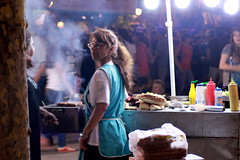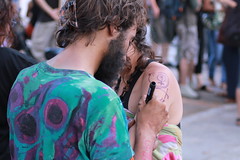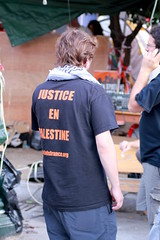Last Sunday I attended a workshop about Science Journalism. It was organized by the
Embassy of the United States in Egypt, and I'd like to share a summary of the workshop and the stuff I learned there with you here.
What Makes a Good Science StoryCurtis Brainard (@
CBrainard) who is a
Science Editot for the Columbia Journalism Review started his presentation by saying that Science is one of the four pillars of human civilization. It's
said here that economy, politics , moral tradition, and the arts & sciences (and the dissemination of them) are the four pillars of what we call civilization. He then said when school children are asked to put how they see science on paper, they usually draw a
Professor-Calculus-like character inside a lab with his coat and glasses. Which is something that has to change, and science should be seen as a part of our daily lives and not to be just locked down inside labs. But he then wondered, why space-travel and
cosmology is one of the most popular sciences among American children despite the fact that it doesn't really have significant effect on people's lives. He then continued, may be because they are inspiring and extend out limits of what's possible and reachable.
He then tried to summarized the most covered topics when it comes to science journalism:
- Health: It's said that people think about their personal health and wealth the most. So if we put money and financial news aside, we are left with subjects related to health, nutrition and fitness as ones of the most important subjects to readers.
- Environment: Then comes environmental news as they too have big effect on people's lives and sometimes their future.
- General Sciences: And in the third rank comes other scientific subjects, which are sometimes more challenging to be covered especially when they are not so related to people's lives
Then came the question, what are the possible angles in order to cover one of the above stories:
- Pure Scientific: You can just put your story in a pure scientific form.
- Life and Health: You can also relate the science in there to people's health and lives in general.
- Business: You can focus on the business behind the science, and who will make money out of it and how.
- Art: Or you can relate the science to art. Which is one of the most challenging yet interesting ways to present your stories. Like those stories that try to discuss the scientific facts behind science fiction films, or other films like Harry Potter. I also think some infographics might be part of this.
Mr. Brainard ended his presentation by saying that science is all about how to make our lives more "efficient", and how to make more with less. And
he added that good science stories are not about trees, planet earth, or experiments in labs. They are and will always be about people and how science affect the lives of those people, and experiments on environmental change sometimes
are more important to measure how people see the risk instead of measuring only temperature changes.
Science Story IdeasChris Mooney (@
ChrisMooney_), the author of "
Unscientific America" and the "
Republican War on Science" gave another presentation where he said that Science Stories are very Political ones by nature, since science changes people's lives and most of the time such change generate resistance to it. He referred to the case where scientific theories such as evolution contradicted with religious beliefs, and those who are against the use of vaccines and relate it to autism. So many Science Stories can be in fact Stories about Science and the related politics, such as research budgets, and rules that makes scientific research results available to public and patents, etc. He also spoke about the importance of blogs and new media, as new source, and how the idea of rivalry between old and new media should be changed.
Deborah Blum (@
deborahblum), a Pulitzer-prize winning
science writer, also wondered in her presentation, in nations where science education is not working well, is it really science journalists role to educate people and act as as second educators to cover holes lefts by schools? She also spoke about the importance of
Investigative Journalism, and for a non-journalist like myself I was glad that she described the term Investigative Journalism in more details as "
that type of journalism that is meant to give voice to the powerless and cover issues that governments and corporations try to keep secret".
Ms. Blum also listed some websites that are useful to science journalists:
The Anatomy of Science News StoriesDavid Dobbs (@
David_Dobbs), a
features-writer specialised in behavioural and psychological science spoke about his own work-flow when writing a new story. He started by saying that he normally writes features (articles with about 5k words). He then summarized three important features that have to exist in good features or stories:
- Compelling and interesting new idea.
- Wonderful researcher, i.e. someone who can speak for hours beautifully and jargon-free on his subject of research that he is passionate about.
- Subject: A story that glues the idea and the research and makes an interesting example of it or tell the history of the research in an interesting and/or detective puzzle-solving way.
He then moved to the main structure of magazine features in general:
- Opening: It starts with a theme, or somebody talking
- Background: Mixture of history of the subject and some needed context to put people in the mood. For example why such research was needed, what problems did people face earlier, etc.
- The Story: This occupies the majority of the article.
- Close: It's helpful to end with an action.
The above sections should be only in the writers mind, and there should be no or just blurred separations between them on paper.
Few more links:Chris Mooney wrote a quick wrap of the workshop and their trip to Egypt, "
Four Days in Cairo"
Beryl Lieff Benderly (
LinkedIn) also participated in the workshop but it's my bad as I didn't take proper note of what she said.
And finally, here is an article
about writing feature stories.



